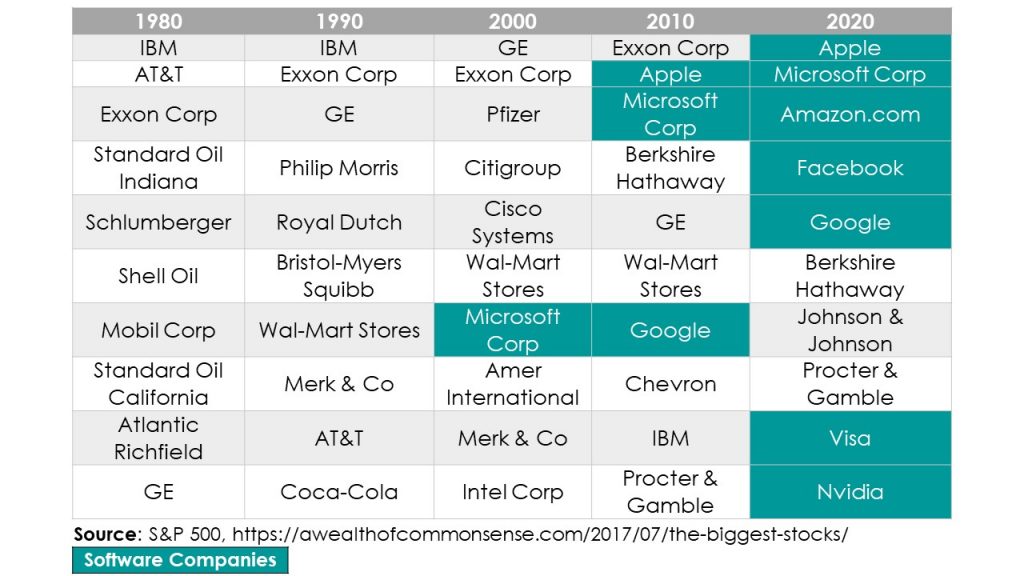Share this post
Bits vs Bytes
May, 2021
From the early 1900s until about 2010, the largest companies in the world were dominated by those operating in the tangible world of bits. Most of these companies developed products and services that were in the domain of chemical engineering (Oil & Gas majors, pharmaceuticals) or mechanical/electrical engineering (Toyota, General Electric, AT&T, IBM).
However, in 2010, an inflection point of sorts was reached and the intangible world of bytes started to dominate. For the first time in history, some of the largest companies in the world were the product of software engineering. Bytes finally had the upper hand over bits. The year 2010 marked 20 years after the creation of the modern internet and 40 years since the invention of the microprocessor. This was no overnight success, but decades of progress finally accumulating into something of great economic value.
The table below shows the top 10 companies in the S&P 500 Index across the decades. The highlighted companies have software as their foundation.

As the venture capitalist Marc Andreesen said, “Software is eating the world”.
However, the question must be asked. Is there anything intrinsically unique about software that means it will continue to dominate or is this all temporary?
Software has two unique characteristics that imply it is likely to continue on its path of dominating the world.
First, it generally requires less capital expenditure than traditional engineering disciplines. There is a reason why most of the big technology companies were started by young adults working from their dormitory or garage; it is a low-cost venture to build your initial product. The most important ingredient for these companies at the start was pure technical competence and the ability to sell – both intangible assets.
Second, making iterations between designs is faster in the ethereal world of software. This means progress is faster. More importantly, this means recovering from mistakes is also faster. For new growth industries, the initial business plan is almost always broken. If companies were not flexible and didn’t adapt based on what their users really wanted, Microsoft would today be selling programming languages and Apple would be selling printed circuit boards. Software engineering has a unique degree of flexibility, unlike its chemical, electrical, and mechanical engineering cousins.
This of course doesn’t mean all software businesses are good. After all, what one engineer can build, another can copy. Having an economic moat is more important now than ever because most people recognise the often-superior economics of these software businesses and want a share of the economic loot.
A similar trend of software eating the world is also seen in Chinese companies. Of the 10 largest companies in the Chinese index, seven are software businesses, exactly matching the ratio in the American S&P 500 index. In Europe, that number drops to one. In the UK, zero.This partly explains why certain equity indices, such as the UK equity index, have lagged over the last 20 years. This of course doesn’t mean that any market is intrinsically bad; any asset at the right price can be a good investment. However, over longer time frames of 7-10 years, certain markets will, unfortunately, continue to perform less well than markets with established and growing software businesses, unless something changes. Software is eating the world, and only China and the US have been invited to the dinner party.
